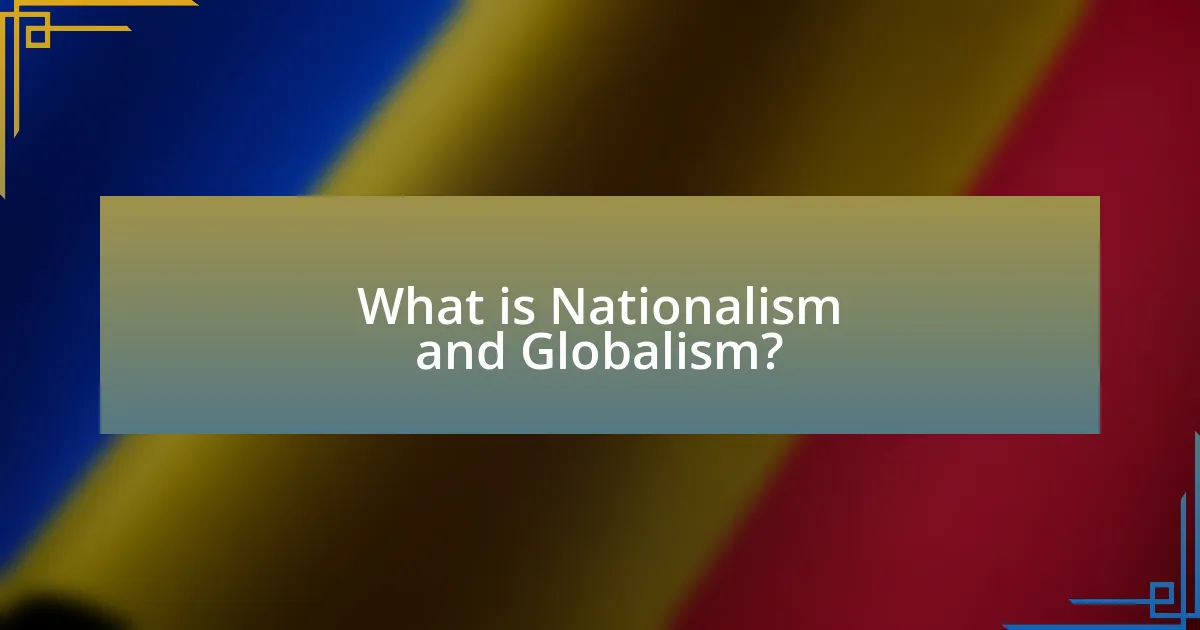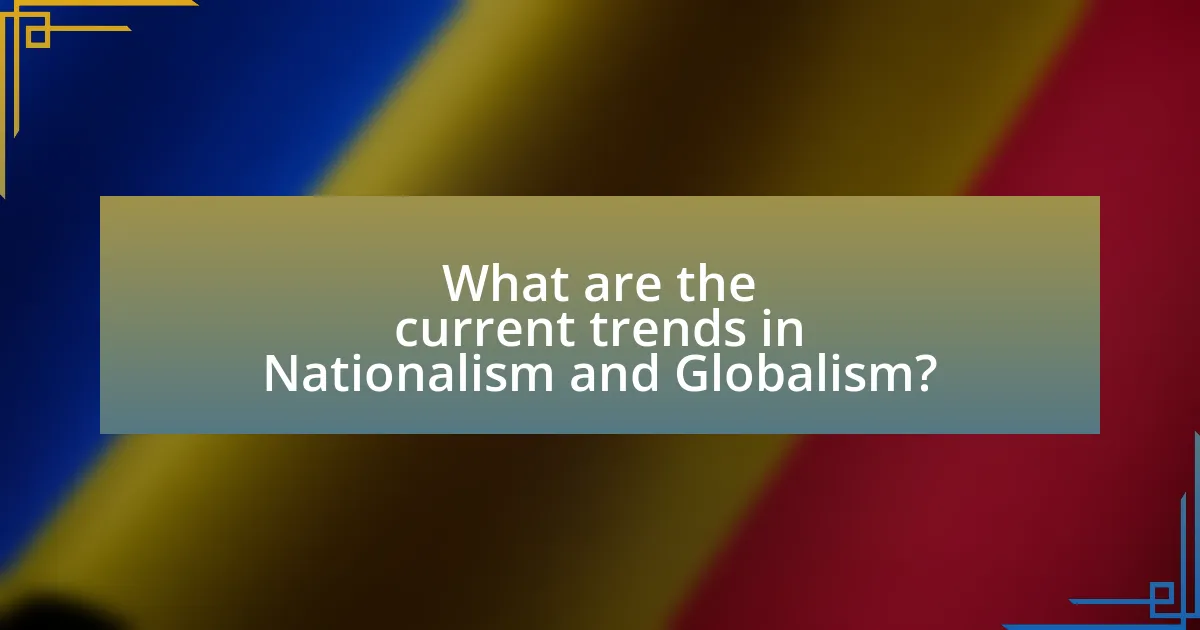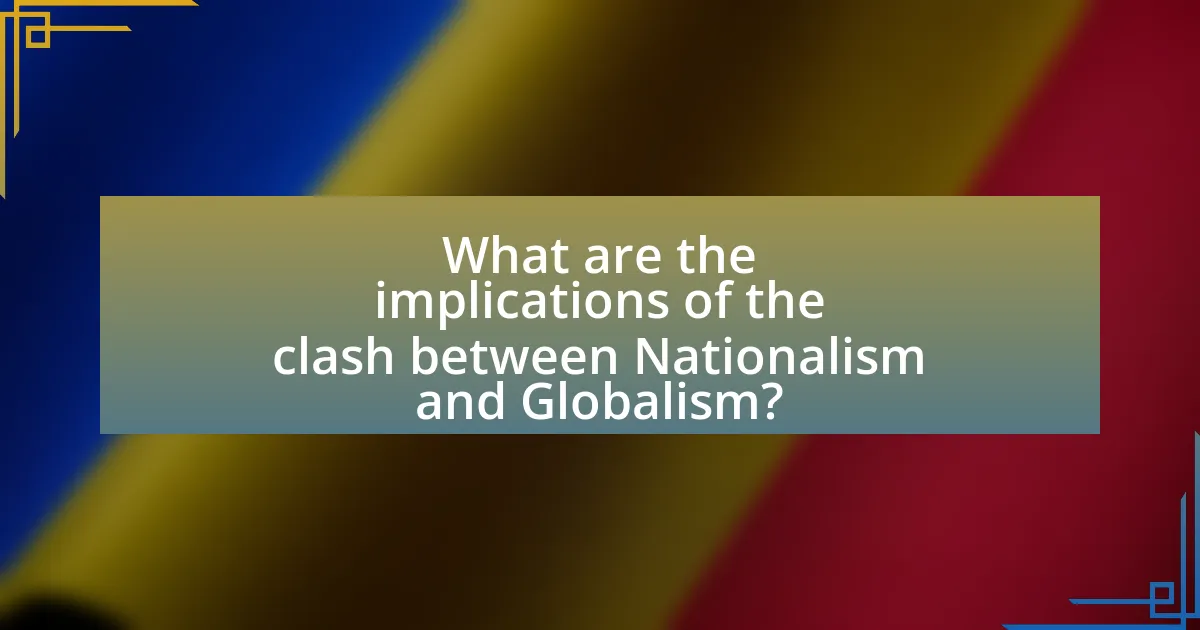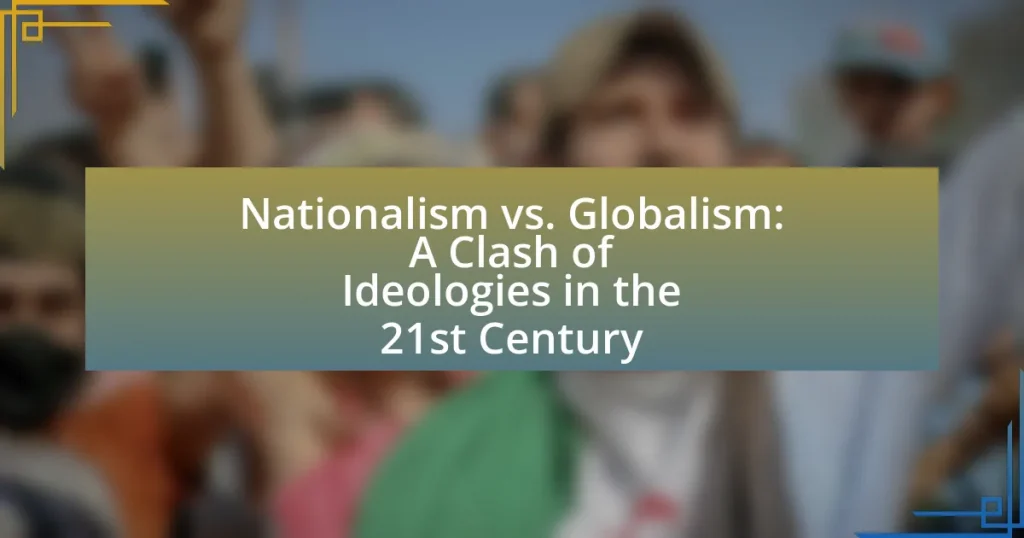Nationalism and globalism represent two contrasting political ideologies shaping contemporary global dynamics. Nationalism prioritizes the interests, culture, and sovereignty of individual nations, often leading to movements that resist globalization and emphasize local identity. In contrast, globalism advocates for interconnectedness among nations, promoting economic cooperation and cultural exchange through international agreements. This article explores the historical roots, core principles, and current trends of both ideologies, examining their implications for national identity, sovereignty, and global governance, as well as the ongoing tensions between them in the 21st century.

What is Nationalism and Globalism?
Nationalism is a political ideology that emphasizes the interests and culture of a particular nation, often prioritizing national sovereignty and identity over international cooperation. Globalism, in contrast, advocates for the interconnectedness of nations, promoting economic, political, and cultural integration across borders. The rise of nationalism can be seen in movements that seek to protect local jobs and cultures, while globalism is supported by entities like the United Nations and trade agreements that encourage collaboration among countries. Historical events, such as the Brexit referendum in 2016, illustrate the tension between these ideologies, as voters chose to prioritize national interests over global integration.
How do Nationalism and Globalism differ in their core principles?
Nationalism and globalism differ fundamentally in their core principles, with nationalism prioritizing the interests and identity of a specific nation, while globalism emphasizes interconnectedness and cooperation among nations. Nationalism asserts that a nation’s sovereignty and cultural identity should be preserved and promoted, often leading to policies that favor domestic over foreign interests. In contrast, globalism advocates for the reduction of national barriers to foster economic, social, and political collaboration on a global scale, as seen in international agreements like the Paris Agreement on climate change. This distinction is evident in historical contexts, such as the rise of nationalist movements in response to globalization, which often seek to reclaim local control and identity against perceived external influences.
What are the historical roots of Nationalism?
The historical roots of nationalism can be traced back to the late 18th century, particularly during the American and French Revolutions, which emphasized the concepts of self-determination and popular sovereignty. These revolutions inspired a sense of national identity and unity among people who shared common language, culture, and history. The Treaty of Westphalia in 1648 also laid the groundwork for modern nation-states by establishing the principle of state sovereignty, which further fueled nationalist sentiments. Additionally, the rise of Romanticism in the 19th century celebrated national heritage and folklore, reinforcing the idea of a collective national identity. These events collectively contributed to the emergence of nationalism as a powerful political ideology in the modern era.
What are the historical roots of Globalism?
The historical roots of Globalism can be traced back to the Age of Exploration in the 15th and 16th centuries, when European powers expanded their trade networks and colonial empires across the globe. This period marked the beginning of increased interconnectedness among nations, driven by economic interests and the exchange of goods, ideas, and cultures. The Industrial Revolution in the 18th and 19th centuries further accelerated Globalism by enhancing transportation and communication technologies, facilitating international trade and migration. Additionally, the establishment of international organizations, such as the League of Nations after World War I and later the United Nations, solidified the framework for global cooperation and governance, emphasizing the importance of collective action in addressing global challenges. These historical developments laid the foundation for contemporary Globalism, characterized by economic interdependence and cultural exchange on a global scale.
What are the key ideologies behind Nationalism?
The key ideologies behind Nationalism include the belief in the primacy of the nation-state, the promotion of national identity, and the pursuit of self-determination. Nationalism asserts that a shared culture, language, and history create a cohesive national identity, which is essential for political sovereignty. This ideology often emphasizes the importance of territorial integrity and the right of a nation to govern itself without external interference. Historical examples, such as the unification of Germany in the 19th century under Otto von Bismarck, illustrate how nationalism can drive political movements aimed at consolidating power within a defined national boundary. Additionally, the rise of nationalist sentiments in various countries during the late 20th and early 21st centuries, such as Brexit in the United Kingdom, further exemplifies the enduring influence of nationalism in contemporary politics.
How does Nationalism influence national identity?
Nationalism significantly influences national identity by fostering a sense of belonging and shared culture among individuals within a nation. This ideology emphasizes common language, history, and traditions, which collectively shape the identity of a nation. For instance, in the 19th century, the rise of nationalism in Europe led to the unification of countries like Germany and Italy, where shared cultural heritage and language were pivotal in forming a cohesive national identity. Additionally, nationalism can manifest in symbols, such as flags and anthems, which further reinforce a collective identity among citizens.
What role does sovereignty play in Nationalism?
Sovereignty is fundamental to nationalism as it embodies the authority of a nation-state to govern itself without external interference. Nationalism emphasizes the importance of a distinct national identity and the right of a people to self-determination, which is inherently linked to the concept of sovereignty. For instance, the rise of nationalist movements often correlates with a desire to reclaim or assert sovereignty against perceived threats from globalization or foreign influence, as seen in various independence movements throughout history, such as the decolonization processes in the mid-20th century. These movements highlight how sovereignty serves as a rallying point for national unity and pride, reinforcing the belief that a nation has the right to control its own destiny.
What are the key ideologies behind Globalism?
The key ideologies behind Globalism include economic interdependence, cultural exchange, and political cooperation. Economic interdependence emphasizes the integration of national economies through trade, investment, and globalization, which has been supported by organizations like the World Trade Organization. Cultural exchange promotes the sharing of ideas, values, and traditions across borders, fostering a sense of global citizenship. Political cooperation advocates for collaborative governance on issues such as climate change and human rights, as seen in international agreements like the Paris Agreement. These ideologies collectively aim to create a more interconnected and cooperative world.
How does Globalism promote international cooperation?
Globalism promotes international cooperation by fostering interconnectedness among nations through trade, communication, and shared governance. This interconnectedness leads to collaborative efforts in addressing global challenges such as climate change, public health, and economic stability. For instance, international agreements like the Paris Agreement on climate change exemplify how globalism encourages countries to work together towards common goals, demonstrating that collective action is essential for tackling issues that transcend national borders.
What economic factors drive Globalism?
Economic factors driving Globalism include trade liberalization, technological advancement, and capital mobility. Trade liberalization reduces tariffs and barriers, facilitating international commerce; for instance, the establishment of the World Trade Organization in 1995 significantly increased global trade volumes. Technological advancements, particularly in communication and transportation, have lowered costs and improved efficiency, enabling businesses to operate on a global scale. Capital mobility allows for the free flow of investments across borders, as seen in the rise of multinational corporations that leverage global supply chains to optimize production and reduce costs. These factors collectively enhance economic interdependence among nations, reinforcing the principles of Globalism.

What are the current trends in Nationalism and Globalism?
Current trends in nationalism include a rise in populist movements and a focus on sovereignty, as seen in countries like Hungary and Brazil, where leaders emphasize national identity and border control. In contrast, globalism is marked by increased international cooperation on issues like climate change and trade, exemplified by agreements such as the Paris Accord and the ongoing efforts of organizations like the World Trade Organization. These trends reflect a tension between local interests and global interdependence, with nationalism often reacting against perceived threats from globalization.
How has Nationalism evolved in the 21st century?
Nationalism in the 21st century has evolved into a more assertive and populist movement, often characterized by a backlash against globalization and immigration. This shift is evident in various countries where leaders have embraced nationalist rhetoric to gain political support, such as Donald Trump’s “America First” policy in the United States and Brexit in the United Kingdom, both of which reflect a desire to prioritize national sovereignty over international cooperation. Additionally, the rise of far-right parties across Europe, such as the National Rally in France and the Alternative for Germany, illustrates a growing trend of nationalism that challenges established political norms and promotes anti-immigrant sentiments. This evolution is further supported by data showing increased public support for nationalist policies in many nations, highlighting a significant shift in political landscapes globally.
What are the recent political movements that exemplify Nationalism?
Recent political movements that exemplify nationalism include the rise of right-wing populist parties in Europe, such as the National Rally in France and the Alternative for Germany (AfD), as well as the Brexit movement in the United Kingdom. These movements emphasize national sovereignty, cultural identity, and opposition to immigration, reflecting a broader trend of nationalist sentiment across various countries. For instance, the National Rally, led by Marine Le Pen, has gained significant electoral support by advocating for stricter immigration controls and prioritizing French citizens’ interests. Similarly, Brexit, which resulted in the UK’s departure from the European Union, was driven by a desire to reclaim national control over laws and borders, showcasing a clear nationalist agenda.
How does Nationalism manifest in different regions of the world?
Nationalism manifests in different regions of the world through various expressions such as cultural pride, political movements, and economic policies. In Europe, for instance, nationalism often emerges in the form of right-wing political parties advocating for stricter immigration controls and the preservation of national identity, as seen with parties like the National Front in France. In Asia, countries like India exhibit nationalism through the promotion of cultural heritage and religious identity, exemplified by the rise of the Bharatiya Janata Party, which emphasizes Hindu nationalism. In Africa, nationalism frequently manifests in post-colonial contexts, where nations strive for self-determination and economic independence, as observed in movements advocating for land reform in countries like Zimbabwe. Each of these examples illustrates how nationalism adapts to local historical, cultural, and political contexts, reinforcing the idea that it is a multifaceted phenomenon shaped by regional dynamics.
What are the recent developments in Globalism?
Recent developments in globalism include the increasing emphasis on multilateral cooperation to address global challenges such as climate change, public health, and economic inequality. For instance, the 2021 United Nations Climate Change Conference (COP26) highlighted global commitments to reduce carbon emissions, demonstrating a collective approach to environmental issues. Additionally, the COVID-19 pandemic has accelerated discussions on global health governance, with initiatives like COVAX aiming to ensure equitable vaccine distribution worldwide. These developments reflect a renewed focus on interconnectedness and collaborative solutions in response to pressing global issues.
How has Globalism been challenged in recent years?
Globalism has been challenged in recent years primarily through the rise of nationalism and protectionist policies. Nationalist movements in various countries, such as the United States with the “America First” policy and the United Kingdom’s Brexit referendum, have emphasized sovereignty and local interests over global cooperation. These movements have gained traction due to public discontent with the perceived negative impacts of globalization, including job losses and cultural dilution. Additionally, the COVID-19 pandemic highlighted vulnerabilities in global supply chains, prompting countries to prioritize domestic production and self-sufficiency, further undermining globalist principles.
What role do technology and communication play in Globalism today?
Technology and communication are fundamental to the advancement of Globalism today, as they facilitate instantaneous connectivity and information exchange across borders. The proliferation of the internet and mobile technologies has enabled global trade, cultural exchange, and collaboration, allowing businesses and individuals to operate on an international scale. For instance, according to a report by the International Telecommunication Union, global internet penetration reached 63% in 2021, significantly enhancing access to information and services worldwide. This connectivity fosters economic interdependence and cultural integration, which are key components of Globalism. Furthermore, social media platforms enable the rapid dissemination of ideas and movements, exemplified by the role of Twitter and Facebook in global social movements like the Arab Spring. Thus, technology and communication are not only enablers of Globalism but also essential drivers of its evolution in the 21st century.

What are the implications of the clash between Nationalism and Globalism?
The clash between Nationalism and Globalism leads to significant political, economic, and social implications. Politically, nationalism often results in the rise of populist movements that prioritize national sovereignty over international cooperation, as seen in the Brexit vote where the UK opted to leave the European Union to regain control over its laws and borders. Economically, this clash can lead to protectionist policies that disrupt global trade, exemplified by the tariffs imposed during the U.S.-China trade war, which aimed to protect domestic industries but also resulted in increased prices for consumers. Socially, the tension between these ideologies can exacerbate divisions within societies, as seen in the polarization of public opinion regarding immigration and multiculturalism, which can lead to social unrest and increased xenophobia. These implications illustrate how the conflict between nationalism and globalism shapes contemporary global dynamics.
How does the conflict between Nationalism and Globalism affect global politics?
The conflict between Nationalism and Globalism significantly shapes global politics by creating tensions that influence international relations, trade policies, and migration patterns. Nationalism often prioritizes the interests of individual nations, leading to protectionist measures and a reluctance to engage in multilateral agreements, as seen in the rise of populist movements in countries like the United States and the United Kingdom. Conversely, Globalism advocates for interconnectedness and cooperation, promoting free trade and open borders, which can clash with nationalist sentiments that seek to preserve cultural identity and economic sovereignty. This ideological struggle has resulted in increased polarization within countries and has affected global governance structures, as evidenced by the challenges faced by institutions like the United Nations and the World Trade Organization in addressing issues that require collective action.
What are the consequences for international relations?
The consequences for international relations include increased tensions between nations, as nationalism often prioritizes domestic interests over global cooperation. This shift can lead to trade wars, reduced diplomatic engagement, and a rise in protectionist policies, which undermine multilateral agreements. For instance, the United States’ withdrawal from the Paris Agreement in 2017 exemplifies how nationalist policies can disrupt global efforts to address climate change, creating rifts in international collaboration. Additionally, the resurgence of nationalism can foster xenophobia and conflict, as seen in the rise of populist movements across Europe, which challenge the European Union’s foundational principles of unity and cooperation.
How does this clash impact global governance?
The clash between nationalism and globalism significantly undermines global governance by creating divisions among nations and complicating international cooperation. Nationalist movements often prioritize domestic interests over collective global challenges, leading to a decrease in multilateral agreements and a rise in protectionist policies. For instance, the withdrawal of the United States from the Paris Agreement in 2017 exemplifies how nationalist agendas can disrupt global efforts to combat climate change, illustrating a broader trend where countries prioritize sovereignty over collaborative governance. This shift not only hampers the effectiveness of international institutions but also fosters an environment of geopolitical tension, making it increasingly difficult to address transnational issues such as trade, security, and environmental sustainability.
What social and economic effects arise from this ideological clash?
The ideological clash between nationalism and globalism leads to significant social and economic effects, including increased polarization and economic protectionism. Socially, nationalism often fosters a sense of identity and belonging among specific groups, which can result in exclusionary practices and xenophobia, as seen in various countries where nationalist movements have gained traction. Economically, this clash can manifest in protectionist policies that restrict trade and immigration, leading to reduced economic growth and innovation. For instance, the rise of nationalist policies in the United States and the United Kingdom has been linked to trade wars and Brexit, which have disrupted established economic relationships and led to uncertainty in global markets.
How does Nationalism influence economic policies?
Nationalism influences economic policies by prioritizing domestic industries and protecting national interests over global trade agreements. This often results in the implementation of tariffs, trade barriers, and subsidies aimed at fostering local production and employment. For instance, countries like the United States under the Trump administration adopted protectionist measures, such as imposing tariffs on steel and aluminum imports, to support American manufacturers and reduce trade deficits. Such policies reflect a nationalist agenda that seeks to enhance economic sovereignty and reduce reliance on foreign goods, thereby reshaping the global economic landscape.
What are the social consequences of rising Nationalism?
Rising nationalism leads to increased social division and polarization within societies. This phenomenon manifests as heightened tensions between different ethnic, cultural, or religious groups, often resulting in social unrest and conflict. For instance, the rise of nationalist movements in various countries has been linked to a resurgence of xenophobia and anti-immigrant sentiments, which can exacerbate social fragmentation. Historical examples include the Balkan conflicts in the 1990s, where nationalist fervor contributed to ethnic violence and societal breakdown. Additionally, nationalism can undermine social cohesion by prioritizing national identity over multiculturalism, leading to the marginalization of minority groups and a decline in social trust.
What strategies can be employed to navigate the tensions between Nationalism and Globalism?
To navigate the tensions between Nationalism and Globalism, countries can adopt a dual approach that balances national interests with global cooperation. This strategy involves promoting policies that protect local industries and cultures while simultaneously engaging in international agreements that address global challenges such as climate change and trade. For instance, countries can implement fair trade practices that support local economies while participating in global markets, ensuring that national priorities are not compromised. Additionally, fostering dialogue between national and global stakeholders can help reconcile differing perspectives, as seen in initiatives like the Paris Agreement, where nations commit to environmental goals while respecting their sovereignty. This balanced approach allows for the preservation of national identity and interests while embracing the benefits of global interconnectedness.
How can policymakers balance Nationalist and Globalist interests?
Policymakers can balance Nationalist and Globalist interests by implementing policies that promote economic cooperation while respecting national sovereignty. For instance, they can create trade agreements that protect local industries and jobs while also encouraging international trade, thereby addressing the concerns of both nationalists who prioritize domestic interests and globalists who advocate for open markets. Evidence of successful balance can be seen in the European Union’s approach, where member states maintain their sovereignty while benefiting from collective economic policies, demonstrating that collaboration can coexist with national interests.
What role can civil society play in bridging the divide?
Civil society can play a crucial role in bridging the divide between nationalism and globalism by fostering dialogue and promoting understanding among diverse groups. Through initiatives such as community engagement programs, civil society organizations facilitate conversations that address misconceptions and build trust between opposing ideologies. For instance, research by the World Economic Forum highlights that civil society groups can effectively mediate conflicts and encourage collaboration by creating platforms for shared interests and mutual respect. This engagement not only helps to reduce polarization but also empowers individuals to participate in democratic processes, thereby strengthening social cohesion and promoting inclusive governance.















